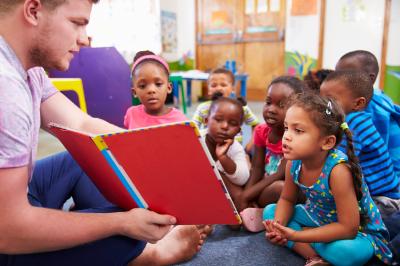-850x142.png)
TK/ECE Certificate Program
Join our virtual professional learning community of educators dedicated to excellence in teaching and learning for Dual Language Learner students! CEEL-LMU was one of the first institutions to offer a certificate in Transitional Kindergarten (TK) and Early Childhood Education (ECE). This distinctive certificate provides TK/ECE educators with the expertise to create and design effective learning environments, curricula, and instruction that are developmentally, culturally, and linguistically appropriate for diverse Dual Language Learners.*
The Transitional Kindergarten/Early Childhood Education Teaching Certificate is offered virtually and consists of a three-course program of study with a combination of real-time webinars and online sessions. This program expands the knowledge, skills, and dispositions of credentialed multiple subject educators through the following courses:
- Course 1 – 'Designing Modified Curricula for TK/ECE'
(Oct 09 - Dec 11, 2025) - Register today! - Course 2 – 'Fostering Family/Community Engagement in TK/ECE'
(Jan 15 - Mar 12, 2026) - Course 3 – 'Using Assessment to Support Early Learning and Development in TK/ECE'
(Mar. 19 - May 21, 2026)
TK/ECE Professional Practicum
Through our Professional Practicum Academy educators can earn up to 12 additional CEUs by engaging in lesson design, delivery, and reflection cycles to refine and strengthen practices for Dual Language Learners.* The Practicum Academy includes classroom application, reflective webinar discussions, and flexible independent online sessions. The practicum is not a certificate but can be taken for credits and professional development. The practicum can be taken to supplement our certificate or as a stand-alone program.
The Practicum Academy engages educators in reflective practices and expands the knowledge, skills, and dispositions of credentialed multiple subject educators through the following courses:
- Practicum Course 1 – Reflective Practice: Curriculum and Instruction
(Sept 29 - Dec 15, 2025) - Register Today! - Practicum Course 2 – Reflective Practice: Parent and Community Engagement
(Jan 13 - Mar 09, 2026) - Practicum Course 3 – Reflective Practice: Assessment in Early Childhood Environments
(Mar. 23 - May 18, 2026)
TK/ECE Academy
This specialized program offers a unique opportunity for teachers to collaborate, apply, and refine their understanding of developmentally, culturally, and linguistically appropriate practices for Dual Language Learners. * The Academy is not a certificate but can be taken for credits and professional development.
Through our TK/ECE Academy educators can earn up to 6 additional CEUs by engaging the following courses:
- Course 1 – 'Early Literacy: Focusing on Dual Language Learners'
(Oct. 02 - Dec 11, 2025) - Register Today! - Course 2 – 'Classroom Ecology: Building an inclusive and responsive learning'
(Jan. 15 - Mar 12, 2026) - Course 3 – 'Purposeful Play: Bringing back the joy of playful learning'
(Apr. 23 - May 28, 2026)
Our program responds to current California Transitional Kindergarten (TK) SB 876 Teacher Requirements, the passage of AB 22 that extends universal access to full-day TK programs, the California Education Code Section 48000(g)(4), and the most recent CDE guidance.
To earn a certificate, participants must complete all three (3) courses (12 CEU units total) with a grade of a "B" or better in each course.**
About Continuing Education Units (CEUs)
The Center for Equity for English Learners offers Professional Certificate Programs through Loyola Marymount University’s Extension Department, which are intended to provide Continuing Education professional learning growth opportunities for salary advancement in conjunction with existing California licensure and certification. The state requirements for teacher licensure and certification are determined by agencies that are not controlled or affiliated with Loyola Marymount University. As such, we strongly recommend that all course participants consult with their district Human Resources department to inquire about continuing education unit (CEU) acceptance, salary point equivalency, and other potential requirements. These units apply towards obtaining an LMU Certificate but do not apply toward a degree at Loyola Marymount University or to state credentialing or licensure requirements.
LMU|CEEL professional development courses are primarily designed for educators and professionals who have previously achieved at least a bachelor’s degree to meet requirements for salary-incremental steps or re-certification credit. They are graduate-level courses of rigorous content requiring a minimum number of hours per semester hour of credit.
*Dual Language Learners (DLLs) are children who have a home language other than English and are learning two or more languages at the same time, or learning a second language while continuing to develop their first language (U.S. Department of Education).
**Prior to course enrollment, participants should check their district’s requirements for CEU acceptance and salary point equivalency.
To register for center updates please complete our interest form.
LMU|CEEL reserves the right to reschedule programs based on course registration or other factors. In the event of a rescheduling registrants will be asked by email if they wish to receive a refund for the registration fee or roll their registration over to the rescheduled dates.
LMU|CEEL's standard refund policy applies for certificate program courses: upon enrollment, tuition is non-refundable.
**Prior to course enrollment, participants should check their district’s requirements for CEU acceptance and salary point equivalency.
-
Instructor shared important information pertinent to the class topic, allowed open discussions and was thorough through each assignment and task presented. Class was open and inviting encouraged group and individual efforts. (Course 1)
-
As an educator I am able to utilize my understanding of healthy family development in my work and share this information with families. I am sensitive to and affirm families' diversity, including cultural traditions, languages, values, socio-economic status, structures, sexual orientation, religion, and individual abilities. This course empowered me to support families to advocate for themselves to address their needs and to develop their community leadership skills. (Course 2)
-
The best qualities of this course was the informative article selections, the collaborations with colleagues, and the feedback from [the instructor] to supports learning experiences. (Course 3)
-
It showcased many approaches to document students’ development. As a learning community we were able to collect data to inform evaluation and reflect on our own teaching practices. (Course 3)


